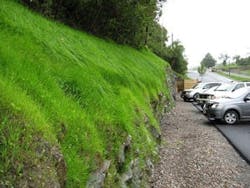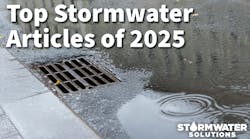About the author: Chris Thomson is owner of Maritime Hydroseed. Thomson can be reached at [email protected] or 506.672.1600.
Rockwood Park is located in the center of Saint John, New Brunswick—Canada’s oldest incorporated city. Landscape design firm Basic Design Associates (BDA) was hired to update, improve and beautify this horticultural gem, and the contract was awarded to Debly Construction in late 2008.
| Basic hydroseed failed Rockwood Park after extreme rainfall. |
Hydroseed A: Swept Away
The original vegetation contract specified that basic Hydroseed A—consisting of seed, fertilizer and cellulose mulch—be applied to a sloped area. The basic hydroseed was applied twice and failed both times due to extreme weather conditions, specifically repeated back-to-back heavy rain events. The basic hydroseed did not protect the slope’s minimal soil against prolonged water runoff from above. Located in a highly visible area, the slope caused the contractor and designers stress and concern.
Natural Alternatives
Staff at BDA had attended a lecture on new fourth-generation erosion prevention technologies at the New Brunswick Road Builders Convention in February 2008. One of the presenters, Steve Zwilling of Profile Products LLC, spoke about vegetated solutions designed to replace rock and concrete, including Flexterra and the GreenArmor system. Following the lecture, BDA contacted Bill Dashwood of Maritime Hydroseed with a question: “Does that sticky stuff [Flexterra] they talked about at NB Road Builders really work?”
“We market to engineers, landscape architects and road building contractors the benefits of vegetated erosion solutions in place of rock and concrete,” Dashwood said. “Why wouldn’t the client choose a natural landscape over a grayscape?”
| Using natural alternatives, grass covered slopes within about one month. |
Site Review & Remediation
A site review conducted by Maritime Hydroseed staff confirmed that the site conditions were a challenge. After Hydroseed A fails, traditionally the next application would be Hydroseed B, consisting of basic hydroseed with blown hay and a tackifier. It was clear that Hydroseed B would not be a satisfactory application to resolve Rockwood Park’s erosion problems.
In the Atlantic Canadian climate, traditional blankets can be ineffective because the soils are rocky and nutrients get drawn into the blanket, leaving the grass deprived. Rock armor and concrete are extremely expensive and unattractive, but natural, permanent and less costly options are available.
The site remediation at Rockwood Park involved rebuilding the washed out areas and adding topsoil. Due to the seasonal rains, Maritime Hydroseed applied a fiber-reinforced matrix for its quick cure time and thick mat-like cover. The topsoil had a neutral pH, and rapid grass growth was necessary.
Quality Seed, Woodbridge, Ontario, Canada, supplied New Brunswick Department of Transportation roadside seed mix, with a high pure live seed count. MultiGro, Petit-Rocher, New Brunswick, Canada, supplied 15-25-15 with 50% sulfur-coated urea fertilizer. Maritime Hydroseed applied Flexterra Flexible Growth Medium at 4,000 lb/acre using the Finn 400 Titan.
Although an unusually wet June persisted, the grass grew quickly and the solution performed as expected. The results 34 days after application are seen in this feature's second photo.


